Get Real |
||
Most of us are extremely nervous during a performance. But we’re seldom as nervous during a practice session. Why? There are many reasons. But here’s the big one: during performance, everything is magnified. Our attention is sharper. We’re more aware of every little mistake. We’re more aware of our weaknesses. We’re more aware of when a mistake might happen. We all know this, of course. But what’s missing is a crucial insight: why are we less aware during practice than we are during a performance? Shouldn’t we be equally aware during practice? Think about it. How well do routine practice sessions prepare us for performance? In practice sessions, we’re comfortable. We have a familiar chair. We’re in a familiar room. There are no distractions. No one stares at us. It’s quiet. If we make a mistake, we’re the only one who hears it. There are no scary consequences. Performance, however, is vastly different. We’re sitting on an unfamiliar chair. We’re in an unfamiliar room. There are distractions. People stare at us. Programs rustle. If we make a mistake, lots of people hear it. If we make too many mistakes, there are scary consequences. In a nutshell, here’s our situation. In performance, we’re uncomfortable and every little mistake upsets us. Yet we prepare for it with practice sessions in which we’re comfortable and every little mistake doesn’t really upset us—at least not as much as it would during a performance. Put this way, is it any wonder that so many of us wilt under the pressure of performance? We should design our practice sessions to closely mimic the reality of performance. Every rep should be done with an imaginary audience at hand. Every mistake should matter. By the time we take the stage, we should be intimately familiar with the heightened awareness and consequences of performance. They’re familiar because we faced them during every minute of practice. This is something great athletes take to heart. Speaking of his attitude toward practice, NBA hall of famer Michael Jordan had this to say: “Every day in practice was like that for me—it was a competition. So when the game comes, it’s nothing that I haven’t already practiced. It’s a routine. Whatever happens in the game now, okay, I’ve done this before.” So let’s get to the nitty-gritty. Here are some performance based practice tips:
Ideally, practice should be more challenging than performance. In performance, we simply go with what we’ve got. The work is done. Just play. If problems come up, deal with them—as we’ll learn to do in the practice room—and move on. In fact, if we do practice sessions right, then we may come to find that the anxiety we expect during a performance pales in comparison to the pressures we daily create for ourselves in practice. Performance would become a pleasant reward for the intense work we’ve done in practice. Now wouldn’t that be a nice change? To download a PDF of this article, click here.
|
||
